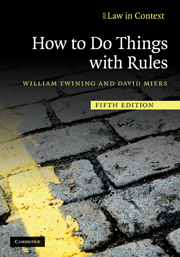Book contents
- Frontmatter
- Contents
- Preface
- Online appendices
- Acknowledgements
- Abbreviations
- Table of statutes and legislative instruments
- Table of cases
- Part I
- Part II Reading, using and interpreting rules in general
- Part III Reading law: reading, using and interpreting legislation and cases
- Part IV
- Index
- Resources on the web
- Appendix I Supplementary materials and exercises on Chapter 1
- Appendix II Normative and legal pluralism
- Appendix III Visual presentation of rules
- Appendix IV The Reading Law Cookbook
- Appendix V Supplementary materials and exercises on Chapters 7–10
- Appendix VI Supplementary materials and exercises on Chapters 9 and 11
- Appendix VII Domestic violence: a case study
- Appendix VIII MPs' expenses: a case study
- Appendix IX Hunting Act 2004: a case study
Appendix X - Suggestions for further reading
Published online by Cambridge University Press: 05 June 2012
- Frontmatter
- Contents
- Preface
- Online appendices
- Acknowledgements
- Abbreviations
- Table of statutes and legislative instruments
- Table of cases
- Part I
- Part II Reading, using and interpreting rules in general
- Part III Reading law: reading, using and interpreting legislation and cases
- Part IV
- Index
- Resources on the web
- Appendix I Supplementary materials and exercises on Chapter 1
- Appendix II Normative and legal pluralism
- Appendix III Visual presentation of rules
- Appendix IV The Reading Law Cookbook
- Appendix V Supplementary materials and exercises on Chapters 7–10
- Appendix VI Supplementary materials and exercises on Chapters 9 and 11
- Appendix VII Domestic violence: a case study
- Appendix VIII MPs' expenses: a case study
- Appendix IX Hunting Act 2004: a case study
Summary
This book can be used as a starting point for exploring an extremely varied and rich literature on a wide range of topics in many disciplines. The following is a selective bibliography of writings which provide possible ways into exploring in more detail some of the general themes and particular topics touched on in the text.
General
We know of no single work which covers exactly the same ground as the present one. Sharon Hanson, Legal Method, Skills and Reasoning (3rd edn, Routledge-Cavendish, 2010) grew out of access courses in which earlier editions of this book were used and adopts a similar approach, but with a more extensive use of figures, charts and algorithms. Frederick Schauer, Playing by the Rules (Oxford University Press, 1991) and Joseph Raz, Practical Reason and Norms (Hutchinson, 1975) cover similar ground to Chapters 2–5 from a philosophical perspective. Neil MacCormick's magisterial quartet, ‘Law, State and Practical Reason’, published by Oxford University Press (esp. Rhetoric and the Rule of Law: A Theory of Legal Reasoning (2005) and Practical Reason in Morality and Law (2009)) is the most substantial jurisprudential contribution in this area since 1999 and is relevant to many themes in this book. We are generally in sympathy with his ideas. On epistemological underpinnings, see G. Samuel, Epistemology and Method in Law (Ashgate, 1999).
- Type
- Chapter
- Information
- How to Do Things with Rules , pp. 576 - 587Publisher: Cambridge University PressPrint publication year: 2010



